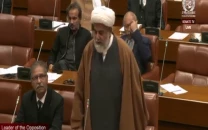Punjab govt grants lifetime pensions to widows
Provincial cabinet also raises minimum wage to Rs40,000, approves allocation of 1,220 flats for industrial workers
1732012115-0/Untitled-design-(14)1732012115-0-640x480.webp)
The Punjab government has raised the provincial minimum wage to Rs40,000 per month and ensured lifetime pensions for widows of government employees. The reforms were adopted during the 28th cabinet meeting, presided over by Chief Minister Maryam Nawaz, where a comprehensive 130-point agenda was approved.
The cabinet approved the allocation of 1,220 flats for industrial workers in Sunder, Kasur and Taxila labour colonies to be distributed through balloting, while firmly rejecting suggestions to charge workers for housing. It also instructed officials to take immediate steps to construct an additional 3,000 flats free of cost for these workers.
وزیراعلیٰ پنجاب مریم نواز شریف کی زیر صدارت صوبائی کابینہ کا 28واں اجلاس۔۔۔ pic.twitter.com/1Jlq33znJ2
— Government of Punjab (@GovtofPunjabPK) August 5, 2025
Education policy saw a major update with official assessments confirmed for Grade V and formal examinations for Grade VIII. Meanwhile, lifelong pensions were approved for widows of government employees, enhancing social protection.
A significant wage reform was also approved, with a uniform minimum monthly salary of Rs40,000 set for 102 categories of skilled, semi-skilled and other workers.
In recognition of flood rescue efforts, the CM announced Rs50,000 bonuses for the rescue worker while praising the agency’s performance and underscored the government’s commitment to supporting frontline workers.
Expanding on prison reform, the cabinet sanctioned formal industries within correctional facilities where inmates will receive wages, and directed the establishment of a third-party monitoring system for jail operations.
Also Read: Opposition slams govt for Kashmir-like treatment at home
To promote private investment, approval was granted for an online petrol pump licence portal requiring only six documents instead of sixteen, enabling investors to obtain NOCs digitally—a move described as a “historical step” toward ease-of-doing-business.
Worker safety was also addressed through the adoption of the Punjab Occupational Safety and Health Rules 2024, marking a first in the province. Maryam ordered the creation of a specialised enforcement force to ensure compliance in high-risk sectors such as construction and sewer operations.
She emphasised that enacting laws alone is not sufficient—implementation and enforcement at every level are essential, as the lives of poor workers are invaluable.
Government officials further approved child labour restrictions via the Punjab Child Labour (Prohibition) Rules 2024, unified appointment procedures for key university administrators, AI‑based traffic systems set to roll out within 90 days, expansion of WASA services to 13 new cities, paid internships for hospital nurses, and various legislative measures covering recruitment, telecom leasing, sugarcane research and local government acts.











1733130350-0/Untitled-design-(76)1733130350-0-208x130.webp)









COMMENTS (1)
Comments are moderated and generally will be posted if they are on-topic and not abusive.
For more information, please see our Comments FAQ